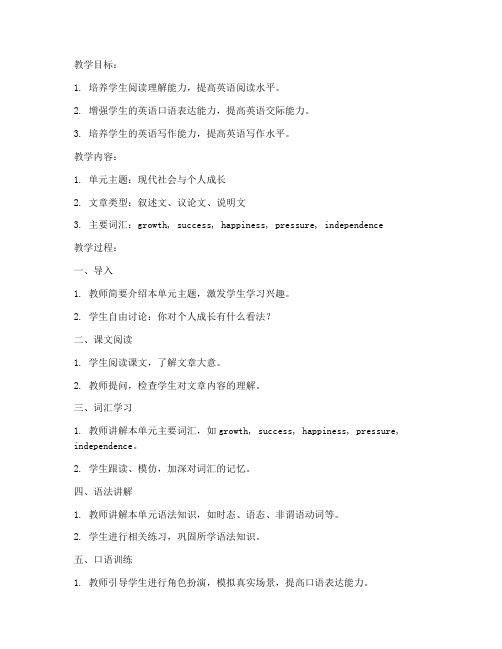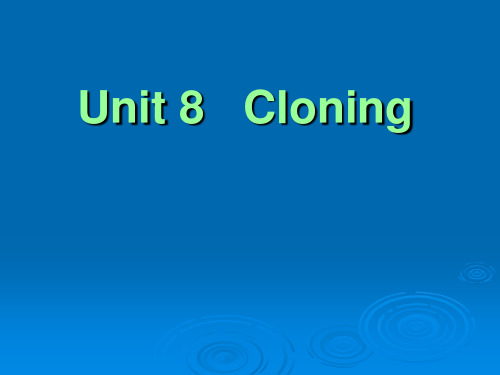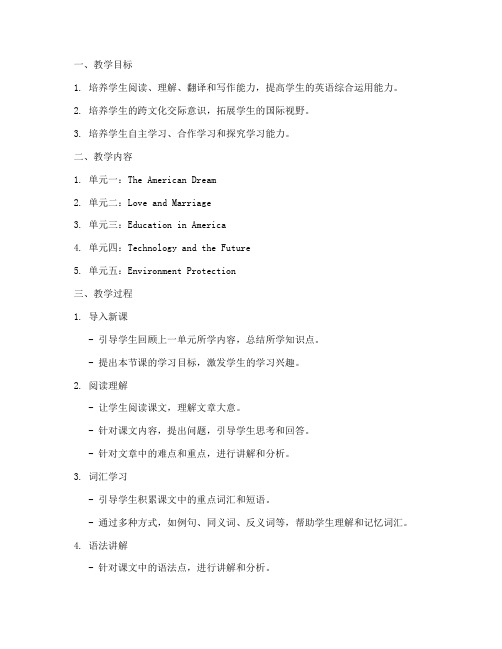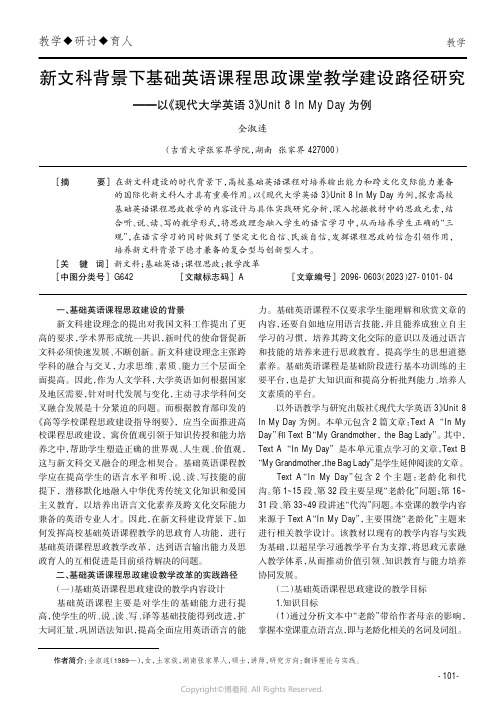现代大学英语第三册8教案
大学英语精读第三册第8课DaydreamaLittle

大学英语精读第三册第8课DaydreamaLittle大学英语精读第三册第8课Daydream a Little导语:白日梦是指清醒时的脑内所产生的幻想及影像,通常是开心的念头、希望或野心。
下面是一篇关于白日梦的英语课文,欢迎大家来学习。
TextDaydreaming has always had reputation, but now scientific research has revealed that daydreaming may actually improve your mental health and creativity. It can even help you achieve your desired goals.Daydream a LittleEugene Raudsepp"Daydreaming again, Barb? You'll never amount to anything if you spend your time that way! Can't you find something useful to do?" Many youngsters have heard words like those from their parents. And until recently this hostile attitude towards daydreaming was the most common one. Daydreaming was viewed as a waste of time. Or it was considered and unhealthy escape from real life and its duties. But now some people are taking a fresh look at daydreaming. Some think it may be a very healthy thing to do.Attitudes towards daydreaming are changing in much the same way that attitudes towards night dreaming have changed. Once it was thought that nighttime dreams interfered with our needed rest. But then researchers tried interrupting the dreams of sleepers. They learned that sleepers who aren't allowed to dream lost the benefits of rest. They become tense and anxious. They become irritable. They have trouble concentrating. Their mental health is temporarily damaged. To feel well again, theymust be allowed to dream.Now researchers are finding that daydreaming may also be important to mental health. Daydreaming, they tell us, is a good means of relaxation. But its benefits go beyond this. A number of psychologists have conducted experiments and have reached some surprising conclusions.Dr. Joan T. Freyberg has concluded that daydreaming contributes to intellectual growth. It also improves concentration, attention span, and the ability to get along with others, she says. In an experiment with school children, this same researcher found that daydreaming led the children to pay more attention to detail. They had more happy feelings. They worked together better. Another researcher reported that daydreaming seemed to produce improved self-control and creative abilities.But that's only part of the story. The most remarkable thing about daydreaming may be its usefulness in shaping our future lives as we want them to be. Industrialist Henry J. Kaiser believed that much of his success was due to the positive use of daydreaming. He maintained that "you can imagine your future." Florence Nightingale dreamed of becoming a nurse. The young Thomas Edison pictured himself as an inventor. For these notable achievers, it appears that their daydreams came true.Dr. Harry Emerson Fosdick believed that the way we picture ourselves is often the way we turn out. He offered this advice: "Hold a picture of yourself … in your mind's eye, and you will be drawn toward it. Picture yourself vividly as defeated, and that will make victory impossible. Picture yourself as winning, and that will contribute immeasurably to success. Do not picture yourself as anything, and you will drift ……"The experiences of some athletes seem to confirm this belief.For instance, John Uelses, a former pole-vaulting champion, used daydreaming techniques before each meet. He would imagine himself winning. He would vividly picture himself clearing the bar at a certain height. He would go over all the details in his mind. He would picture the stadium and the crowds. He'd even imagine the smell of the grass and the earth. He said that this exercise of the imagination left memory traces in his mind that would later help his actual performance.Why would a mental vision of success help produce real success? Dr. Maxwel Maltz, a surgeon and author, say this: "Your nervous system cannot tell the difference between an imagined experience and real experience. In either case it reacts automatically to information that you give it …… It reacts appropriately to what you think or imagine to be true."He believes that purposeful daydreaming builds new "memories" in the brain. These positive memories improve a person's self-image. And self-image has an important effect on a person's action and accomplishments.Can you use purposeful daydreaming to shape your own future? Why not try? Here is how those who believe in creative daydreaming recommend going about it. Choose a time when you can be alone and undisturbed. Close your eyes, to permit your imagination to soar more freely. Many people find that they get best results by pretending that they are sitting before a large screen. They project the desired image of themselves onto that screen.Now picture yourself —— as vividly as possible ——the way you want to be. Remember to picture your desired goals as if you had already attained them. Go over all the details of this picture. See them clearly and sharply. Impress them strongly on yourmemory. The resulting memory traces will supposedly start affecting your everyday life. They will help lead you to the attainment to your goals.Of course daydreaming is no substitute for hard work. If it's athletic achievement you want, you also have to get lots of practice in your sport. You have to work hard to develop skills. If it's school success you're after, you can't neglect studying Daydreaming alone can't turn you into your heart's desire. But in combination with the more usual methods of self-development, it might make a critical difference. It could be the difference between becoming merely good at something and becoming a champion.If what researchers are saying is true, a life lived without fantasies and daydreams isn't as rich and rewarding as life can be. So they suggest setting aside a few minutes each day for daydreaming. By so doing, you may improve your physical and mental well-being. By taking a ten-or fifteen-minute "vacation" into the realm of imagination each day, you may add much to the excitement and enjoyment of your life. And who knows: You might see your own daydreams come true.New wordshostilea. unfriendly; belonging to an enemy 敌对的viewvt. consider, regardescapen. & v. 逃跑;逃避nighttimea. occurring at nightinterferevi. get in the way of another 干涉;妨碍interference n.researchern. advantage, profit, good effect 益处tensea. feeling or showing nervous anxiety 紧张的`irritablea. easily annoyed or made angrymeansn. method or waypsychologistn. person who has studied or is skilled in psychology 心理学家contributevi. help in bringing about 贡献growthn. growing; developmentconcentrationn. concentrating or being concentratedspann. length of time during which sth. Continuses or works well 一段时间self-controln. control of one's own feelings, behavior, etc.creativea. having the power to create; inventiveremarkablea. deserving attention; unusual, out of the ordinary 显著的;非凡的shapevt. influence and determine the course or form of 形成,塑造industrialistn. one owing an industry or engaged in its managementmaintainvt. state or assert as true; keep up 断言;维持picturevt. imagine; make a picture ofinventorn. a person who makes up or produces sth. newnotablea. outstanding; worthy of notice 著名的;值得注意的achievern. one who achieves; winnervividlyad. in a lively manner 生动地;逼真的vivid a.immeasurablyad. to an extent or degree too great to be measured; beyond measuredriftvi. float or be driven along by wind, waves or currents 漂(流)athleten. person who is trained and skilled in physical exercises and who competes in games that need strength and speed 运动员pole-vaultingn. jumping with the help of a long pole held in the hand 撑竿跳championn. person or team taking the first place in competition 冠军meetn. (AmE) gathering esp. for competitive sports 下载文档。
现代大学英语第三册教案

教学目标:1. 培养学生阅读理解能力,提高英语阅读水平。
2. 增强学生的英语口语表达能力,提高英语交际能力。
3. 培养学生的英语写作能力,提高英语写作水平。
教学内容:1. 单元主题:现代社会与个人成长2. 文章类型:叙述文、议论文、说明文3. 主要词汇:growth, success, happiness, pressure, independence教学过程:一、导入1. 教师简要介绍本单元主题,激发学生学习兴趣。
2. 学生自由讨论:你对个人成长有什么看法?二、课文阅读1. 学生阅读课文,了解文章大意。
2. 教师提问,检查学生对文章内容的理解。
三、词汇学习1. 教师讲解本单元主要词汇,如growth, success, happiness, pressure, independence。
2. 学生跟读、模仿,加深对词汇的记忆。
四、语法讲解1. 教师讲解本单元语法知识,如时态、语态、非谓语动词等。
2. 学生进行相关练习,巩固所学语法知识。
五、口语训练1. 教师引导学生进行角色扮演,模拟真实场景,提高口语表达能力。
2. 学生自由组合,进行对话练习。
六、写作指导1. 教师讲解本单元写作技巧,如文章结构、段落划分、过渡词的使用等。
2. 学生根据所学知识,完成一篇作文。
七、课堂小结1. 教师对本节课所学内容进行总结,强调重点和难点。
2. 学生回顾所学内容,提出疑问。
八、课后作业1. 完成课后练习题,巩固所学知识。
2. 预习下一单元内容,为下节课做好准备。
教学评价:1. 课堂表现:观察学生在课堂上的参与程度、互动情况等。
2. 课后作业:检查学生完成作业的质量,了解学生的学习情况。
3. 期中、期末考试:评估学生的学习成果。
教学反思:1. 教师应关注学生的个体差异,因材施教。
2. 注重培养学生的英语综合运用能力,提高学生的英语素养。
3. 结合实际生活,引导学生将所学知识运用到实际中。
unit 8 cloning全新版大学英语第三册第八单元课件

12. beforehand: in advance; earlier e.g. Catherine got married without telling anyone beforehand. Mum had done most of the cooking beforehand, so we weren’t tied to the kitchen.
2. give birth to: 1) bear (a bird), bring forth e.g. Although a mother panda often gives birth to two cubs, she usually abandons one of them without attempting to care for it. The research has shown that mothers who smoke give birth more frequently to premature or underweight babies. create, originate e.g. The extraordinary experience gave birth to his latest novel. Einstein gave birth to a whole new way of looking at matter and energy. 3. for all the world: in every respect; exactly e.g. I felt for all the world as if I was still a child. He looked for all the world like a country doctor.
现代大学英语3教案

一、教学目标1. 培养学生阅读、理解、翻译和写作能力,提高学生的英语综合运用能力。
2. 培养学生的跨文化交际意识,拓展学生的国际视野。
3. 培养学生自主学习、合作学习和探究学习能力。
二、教学内容1. 单元一:The American Dream2. 单元二:Love and Marriage3. 单元三:Education in America4. 单元四:Technology and the Future5. 单元五:Environment Protection三、教学过程1. 导入新课- 引导学生回顾上一单元所学内容,总结所学知识点。
- 提出本节课的学习目标,激发学生的学习兴趣。
2. 阅读理解- 让学生阅读课文,理解文章大意。
- 针对课文内容,提出问题,引导学生思考和回答。
- 针对文章中的难点和重点,进行讲解和分析。
3. 词汇学习- 引导学生积累课文中的重点词汇和短语。
- 通过多种方式,如例句、同义词、反义词等,帮助学生理解和记忆词汇。
4. 语法讲解- 针对课文中的语法点,进行讲解和分析。
- 通过例句和练习,让学生掌握语法知识。
5. 写作训练- 让学生根据课文内容,进行写作练习。
- 指导学生如何组织文章结构,提高写作水平。
6. 课堂活动- 组织课堂讨论,让学生发表自己的观点。
- 进行角色扮演,提高学生的口语表达能力。
7. 课后作业- 布置课后作业,巩固所学知识。
- 作业内容:阅读课文,完成课后练习;背诵课文中的重点词汇和短语;完成写作练习。
四、教学评价1. 课堂表现:观察学生在课堂上的学习态度、参与度和积极性。
2. 作业完成情况:检查学生课后作业的完成情况,了解学生的学习效果。
3. 考试成绩:通过单元测试和期中、期末考试,评估学生的学习成果。
五、教学反思1. 根据学生的学习情况,调整教学方法和进度。
2. 注重培养学生的英语综合运用能力,提高学生的英语素养。
3. 加强与学生的沟通,关注学生的心理健康,营造良好的学习氛围。
现代大学英语3 Unit 8 In My Day 词汇精讲

Unit 8 In My Dayaffluent, fluent●She was in English, French, and German.●Cigarette smoking used to be commoner among people.amount v.●His earnings are said to amount to £300 000 per annum.●Her academic achievements don't amount to much.●Her answer amounted to a complete refusal.●Their actions amount to a breach of contract.axebanal: ordinary and not interesting, because of a lack of new or different ideas●another banal TV sitcom●conversations about the most banal subjectscommonplace adj. happening or existing in many places, and therefore not special or unusual●Car thefts are commonplace in this part of town.barrel●The wine is aged (使酒变陈) in oak barrels.●He pushed the barrel of the gun into the other man's open mouth.●The manager had us over a barrel - either we work on a Saturday or we lose ourjobs.batter: to hit someone or something again and again, in a way that hurts someone or causes damage●The court heard that he had battered his wife to death.●The rain battered against the windows.battered: old and in bad condition●She would often be seen driving around town in her battered old car.●battered woman/wife/husband/babybrisk●We went for a brisk walk.●Business is always brisk during the holiday season.●Put on your sweater, it's brisk out.caution: to warn sb. to be careful about sth.●Sam cautioned him against making a hasty decision.●Officials were quick to caution that these remarks did not mean an end to thepeace process.●He cautioned them to avoid the forest at night.rope, cord, string, thread●The kids tied a to the tree and used it as a swing.● a silk bag tied with a gold●Her key hung on a around her neck.●I'm looking for a needle and .customary●在一些文化当中,新娘通常会穿白色。
新文科背景下基础英语课程思政课堂教学建设路径研究——以《现代大学英语3》Unit_8_In_My_D

[摘要]在新文科建设的时代背景下,高校基础英语课程对培养输出能力和跨文化交际能力兼备的国际化新文科人才具有重要作用。
以《现代大学英语3》Unit 8In My Day 为例,探索高校基础英语课程思政教学的内容设计与具体实践研究分析,深入挖掘教材中的思政元素,结合听、说、读、写的教学形式,将思政理念融入学生的语言学习中,从而培养学生正确的“三观”,在语言学习的同时做到了坚定文化自信、民族自信,发挥课程思政的信念引领作用,培养新文科背景下德才兼备的复合型与创新型人才。
[关键词]新文科;基础英语;课程思政;教学改革[中图分类号]G642[文献标志码]A[文章编号]2096-0603(2023)27-0101-04新文科背景下基础英语课程思政课堂教学建设路径研究———以《现代大学英语3》Unit 8In My Day 为例全淑连(吉首大学张家界学院,湖南张家界427000)一、基础英语课程思政建设的背景新文科建设理念的提出对我国文科工作提出了更高的要求,学术界形成统一共识,新时代的使命督促新文科必须快速发展、不断创新。
新文科建设理念主张跨学科的融合与交叉,力求思维、素质、能力三个层面全面提高。
因此,作为人文学科,大学英语如何根据国家及地区需要,针对时代发展与变化,主动寻求学科间交叉融合发展是十分紧迫的问题。
而根据教育部印发的《高等学校课程思政建设指导纲要》,应当全面推进高校课程思政建设,寓价值观引领于知识传授和能力培养之中,帮助学生塑造正确的世界观、人生观、价值观,这与新文科交叉融合的理念相契合。
基础英语课程教学应在提高学生的语言水平和听、说、读、写技能的前提下,潜移默化地融入中华优秀传统文化知识和爱国主义教育,以培养出语言文化素养及跨文化交际能力兼备的英语专业人才。
因此,在新文科建设背景下,如何发挥高校基础英语课程教学的思政育人功能,进行基础英语课程思政教学改革,达到语言输出能力及思政育人的互相促进是目前亟待解决的问题。
现代大学英语精读3第二版Unit8Book3精品PPT课件

Russell Baker
Background
Book
• The book’s greatest achievement is Baker’s portrayal of his mother, a driven woman haunted by poverty and dreams of her son’s success. “I would make something of myself,” he wrote, “and if I lacked the grit to do it, well then she would make me make something of myself.”
Warming up Objectives
1. Content – to understand the problem of aging – to understand the problem of generation and ways to solve it – to relate the problem to personal and social experience
• A columnist for The New York Times, where he applies his unique brand of humor to social commentary.
• The present text is taken from Russell Baker’s autobiography, Growing Up, which won him the second Pulitzer Prize in 1983.
• With a moving mix of humor and sadness, Baker insightfully recounts the struggles the family endured in depression-era after his father passed away (when Baker was only 5).
现代大学英语第三册Unit_8_In_My_Day

1. bend
v. a. to lean forwards and downwards b. to become curved c. to apply the mind closely
Examples: She bent forwards and whispered in my ear. The stream bends to the west. He was bent on making them happy.
those ancient bores… (53)
I find cleaning a real bore.
I won’t bore you with all the details.
Expressions: bend sb.’s ear bend your mind/thoughts to sth. bend before be bent on
Translation
1. 谈论不休 2. 专注于 3. 屈服于 4. 一心想做某事
2. bore
n. a. sb. who talks too much about things that are not very interesting
Generation Gap
There were major differences in such matters as musical __ta_s_te_s__, fashion, drug use, and politics. This situation may have been _a_c_c_e_le_ra_t_ed__ by the unprecedented size of the young baby boomer generation, which gave them a greater sense of power and _in_f_lu_e_nc_e_ than had been seen previously, and the younger generation was willing to _re_b_e_l __ against social norms to a previously unseen degree.
